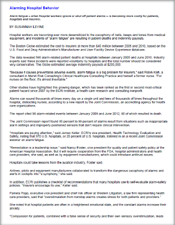Resource:
Alarming Hospital Behavior
Alarm fatigue — when hospital workers ignore or shut off patient alarms
Alarm fatigue — when hospital workers ignore or shut off patient alarms — is becoming more costly for patients, hospitals and insurers.
BY SUSANNAH LEVINE
Hospital workers are becoming ever more desensitized to the cacophony of bells, beeps and tones from medical equipment, and incidents of "alarm fatigue" are resulting in patient deaths and indemnity payouts.
The Boston Globe estimated the cost to insurers at more than $40 million between 2005 and 2010, based on the U.S. Food and Drug Administration's Manufacturer and User Facility Device Experience database.
The data revealed 566 alarm-related patient deaths at hospitals between January 2005 and June 2010. Industry experts said these incidents were reported voluntarily by hospitals and the total number should be considered very conservative. The Globe estimated average indemnity payouts at $200,000.
"Because it causes preventable adverse events, alarm fatigue is a big problem for insurers," said Robin Kish, a consultant in Marsh Risk Consulting's Clinical Healthcare Consulting Practice and herself a former nurse. "For nurses on the floor, it's almost inevitable."
Other studies have highlighted this growing danger, which has been ranked as the first or second most-critical patient hazard since 2007 by the ECRI Institute, a health care research and consulting nonprofit. Alarms can sound thousands of times every day on a single unit and tens of thousands of times throughout the hospital, distracting nurses, according to a new report by the Joint Commission, an accrediting agency for health care organizations.
The report cited 98 alarm-related events between January 2009 and June 2012, 80 of which resulted in death.
The Joint Commission report found 85 percent to 99 percent of alarms result from situations such as inappropriate alarm settings and improperly positioned sensors that don't require clinical intervention. "Hospitals are paying attention," said James Keller, ECRI's vice president, Health Technology Evaluation and Safety, noting that 970 U.S. hospitals, or 20 percent of U.S. hospitals, listened in on a recent Joint Commission webinar on alarm fatigue.
"Remediation is a leadership issue," said Nancy Foster, vice president for quality and patient safety policy at the American Hospital Association. But it will require cooperation from the FDA, hospital administrators and health care providers, she said, as well as by equipment manufacturers, which could introduce antitrust issues.
Hospitals could take lessons from the aviation industry, Foster said. Airlines, pilots and equipment manufacturers collaborated to transform the dangerous cacophony of alarms and alerts in cockpits into "a symphony," she said.
In addition, ECRI publishes a checklist of recommendations that many hospitals use to self-evaluate alarm-safety policies. "Insurers encourage its use," Keller said.
Pamela Popp, executive vice president and chief risk officer at Western Litigation, a law firm representing health care providers, said that "overstimulation from nonstop alarms creates stress for both patients and providers."
She noted that hospital patients are often in a heightened emotional state, and the constant alarms increase their anxiety.
"Compassion for patients, combined with a false sense of security and their own sensory overstimulation, leads nurses to behavior like turning alarms off or down," she said. "Without malice or deliberate neglect, sometimes nurses turn alarms down to make their patients more comfortable."
It also adds to nurses' stress, Propp said. And that stress contributes to the high rate of workers' compensation claims for nurses, according to a 2012 Robert Wood Johnson study. But Mary Cashman, a nurse at the Hospital of the University of Pennsylvania, said turning off or ignoring an alarm is an unthinkable deviation from the standard of care. Her hospital, she said, has mechanisms in place to catch these human errors.
"A new nurse might filter out noise when adjusting to the hundreds of urgent tasks we prioritize at any moment," Cashman said. "But turn off an alarm? Never."
SUSANNAH LEVINE is a freelance writer with 25 years of experience writing and editing for trade publications.
SOURCE: http://www.riskandinsurance.com/

